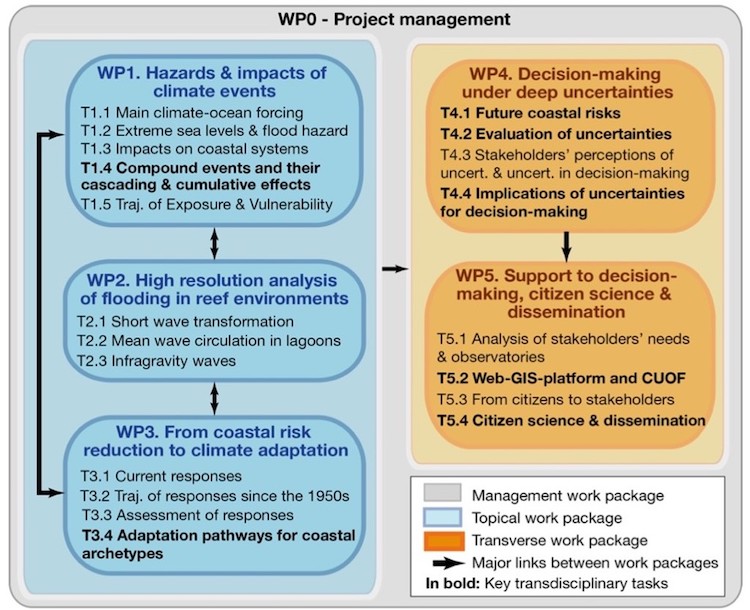METHODOLOGY:
FUTURISKS uses an innovative threefold ‘past-to-future’, interdisciplinary and participative approach. The ‘past-to-future’ approach consists in investigating last century’s climate-ocean events as well as the processes driving coastal erosion and flooding and their societal impacts to better comprehend future coastal risks based on concrete, context-specific, and robust material. It mainly relies on archival research, field measurement, numerical modeling of physical processes, satellite imagery analysis, and the reconstruction of the cascades of impacts of past events using social science methods. The interdisciplinary approach involves researchers specializing in geosciences (physical oceanographers and geomorphologists from BOREA, BRGM, ENTROPIE, ESPACE-DEV/CUFR Mayotte, Géo-Océan, Géosciences-Montpellier/Gladys, LETG-Caen, LIENSs, LOPS, MIO, OSU-Réunion, SGNC-OBLIC, Shom and SPC) and social and human sciences (geographers, experts in geomatics, political scientists, lawyers, anthropologists from CERI, LETG-Caen, LETG-Brest UBO, LAGAM and LIENSs) in five cross-Work Package tasks: the reconstruction of past climate (including compound) events and their impacts, a high-resolution analysis of the physical processes driving extreme water levels and flooding, the assessment of adaptation measures, the assessment of future risks and related uncertainties, and the setting up of an interactive and tailored web platform aimed at supporting decision-making and disseminating results among stakeholders. The participatory approach (e.g. workshops, citizens’ involvement in data generation) relies on a close collaboration with concerned stakeholders.
FUTURISKS comprises five main steps: (1) The study of past-to-present climate-ocean events and their impacts on coastal physical and human systems, from the analysis of climate-ocean forcing to the reconstruction of chains of impacts of compound events; (2) The high resolution analysis of the processes driving coastal flooding in contrasting coral reef environments; (3) The assessment of risk reduction and climate change adaptation policies and actions, and design of adaptation pathways for representative tropical island coastal archetypes; (4) The evaluation of future risks, including uncertainties and their implications for decision-making; (5) The design of tailored tools (interactive web platform, catalogue of adaptation solutions) aimed at supporting decision-making and disseminating the results obtained towards concerned stakeholders and the civil society.

